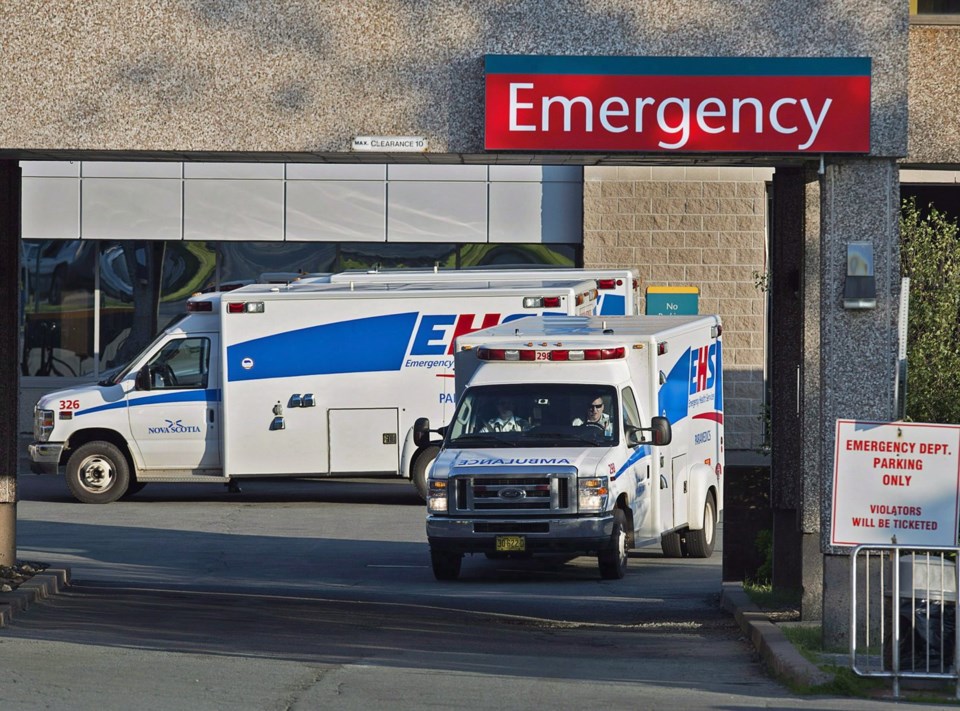HALIFAX — Nova Scotia's health system is improving its methods for early detection of sepsis, a life-threatening condition that occurs when the immune system reacts to infection by attacking the body's organs.
Introduced in January 2024, the new program offers front-line caregivers in emergency rooms new tools and training to help them determine when patients might be at risk. The reform comes after several high-profile deaths over the past five years, with families of deceased patients arguing their loved ones could have been saved had their infections been caught earlier.
Data released by Nova Scotia Health says prior to January 2024 about 55 per cent of patients at six health facilities who met criteria for sepsis were receiving antibiotic treatment within three hours after triage, for an average wait of 233 minutes. Now, it's about 82 per cent of patients receiving the vital treatment within three hours, with the average wait down to 124 minutes.
Dr. Vanessa Sweet, a medical lead in the program, said in a recent interview that quick response to sepsis is critical to saving lives. The reform is an "enormous improvement," she said.
The program includes what she refers to as "a package of approaches," which include offering front-line workers a box of supplies needed for starting sepsis care. A new set of directives also allows nurses to administer a first dose of antibiotics without a prescriber's signature, in select cases where symptoms are clear.
The new approaches are critical in cases where time is often of the essence, said Sweet. The anesthesiologist said by having nurses take the first step, "we're not behind the eight ball" when the patient sees a doctor.
In a recent email to The Canadian Press, Kim DeWolfe says she hopes her mother's case factored into the province's decision to improve its sepsis detection and care. In 2022, Diane Breen died from sepsis after spending eight hours waiting at the Aberdeen Hospital in New Glasgow, N.S., before being briefly seen by a doctor about a urinary tract infection.
Breen — a runner without health conditions — had told medical staff about a week of chills and cold sweats, but she was nonetheless discharged to her home with an antibiotic prescription, according to family. Within hours, she was dead.
"For me, this initiative is an acknowledgment that there were things that could have been done differently which may have resulted in a different outcome for my mother," DeWolfe said. "From triage to discharge no one adequately screened my mother for sepsis."
"I support these changes. Proper screening, along with these kits, will save lives."
Sweet, who has been practising in Nova Scotia since 2017, said that before the program was introduced, a review showed "our sepsis care wasn't as good as it should be."
A key element of the new program are staff "sepsis champions" in ERs, where a health worker on each shift is available for expert advice in recognizing the condition.
Kayla Dort, an emergency care nurse and program champion at the Cobequid Community Health Centre, said in an interview Friday that spotting the condition isn't easy. "We see it all the time. It's a very prominent and difficult illness to capture sometimes," she said.
Nurses now have access to a small card that explains the criteria to investigate potential sepsis, including factors such as elevated temperature, abnormal heart rate, and decreased blood pressure. As well, nurses are also asked to consider risk factors such as whether patients are suffering from other illnesses.
Dort has pioneered a small slogan that is posted around ERs titled, "Time is organ," with an hourglass depicting the passage of time — a reference to how the condition can damage organs and tissue if untreated.
The program will be expanded to one of the city's largest hospitals, the Halifax Infirmary, this fall, she said.
Meanwhile, a team of Canadian researchers has created a device that can quickly test a patient's blood and predict whether they are going to develop sepsis. The device — called Powerblade — produced the results in less than three hours. Researchers, including with the National Research Council Canada, were hoping to begin a clinical trial with Powerblade this year.
Dr. Claudia dos Santos at St. Michael’s Hospital in Toronto, who is the senior author of a research paper about Powerblade published in May in the journal Nature Communications, says sepsis kills thousands of people in Canada and close to 50 million people worldwide every year.
This report by The Canadian Press was first published June 30, 2025.
Michael Tutton, The Canadian Press



